
Rogier van der Weyden Painting Reproductions 1 of 3
c.1399/00-1464
Netherlandish Northern Renaissance Painter
Rogier van der Weyden, also known as Rogier de le Pasture (1399/1400 - June 18, 1464) is, with Jan van Eyck, considered one of the greatest exponents of the school of Early Netherlandish painting.
Life and family
Rogier van der Weyden was born in Tournai as 'Rogier de le Pasture' (Roger of the Pasture) in 1399 or 1400. His parents were Henri de le Pasture and Agnes de Watrelos. The family had settled before in the city of Tournai where Rogiers father worked as a 'maitre-coutelier' (knife manufacturer). In 1426 Rogier married to Elisabeth, the daughter of the Brussels shoemaker Jan Goffaert and his wife Cathelyne van Stockem. Rogier and Elisabeth had four children: Cornelius who became a carthusian monk was born in 1427, a daughter Margaretha in 1432. Before 21 October 1435 the family settled in Brussels where the two younger children were born: Pieter in 1437 and Jan the next year. From the second of March 1436 onwards held the title of 'painter to the town of Brussels' (stadsschilder) a very prestigious post because Brussels was at that time the most important residence of the splendid court of the Dukes of Burgundy. It was at the occasion of his move to the Dutch-speaking town of Brussels that Rogier began using the Dutch version of his name: 'Rogier van der Weyden'.
Training as a painter
Less is certain about Rogier's training as a painter. The archival sources from Tournai (completely destroyed during World War II, but luckily partly transcribed in the 19th and early 20th century) are somewhat confusing and have led to different interpretations by scholars. From a document it is known that the city council of Tournai offered wine in honour of a certain 'Maistre Rogier de le Pasture' on March the 17th 1427. However, on the 5th of March of the following year the records of the painters' guild show a certain 'Rogelet de le Pasture' entered the workshop of Robert Campin together with Jacques Daret. Only five years later, on the first of August 1432, Rogier de le Pasture obtains the title of 'Master' (Maistre) as a painter. Many have doubted whether Campin's apprentice 'Rogelet' was the same as the master 'Rogier' that was offered the wine back in 1426. The fact that in 1426-1427 Rogier was a married man in his late twenties, and well over the normal age of apprenticeship has been used as an argument to consider 'Rogelet' as a younger painter with the same name. In the 1420's however the city of Tournai was in crisis and as a result the guilds were not functioning normally. The late apprenticeship of Rogier/Rogelet may have been a legal formality. Also Jacques Daret was then in his twenties and had been living and working in Campin's household for at least a decade. It is also possible that Rogier obtained an academic title (Master) before he became a painter and that he was awarded the wine of honour on the occasion of his graduation. The sophisticated and 'learned' iconographical and compositional qualities of the paintings attributed to him are sometimes used as an argument in favour of this supposition. The social and intellectual status of Rogier in his later life surpassed largely that of a mere craftsman at that time. In general the close stylistical link between the documented works of Jacques Daret, and the paintings attributed to Robert Campin and Rogier van der Weyden is considered as the main argument to consider Rogier van der Weyden as a pupil of Robert Campin.
Career
After he settled in Brussels Rogier began a prosperous career that would make him the most famous painter in Europe at the time he died in 1464. Different properties and investments are documented and witness his material prosperity. The portraits he painted of the Burgundian Dukes, their relatives and courtiers, point to his good relations with the richest and most powerful sovereigns in Europe.
The Miraflores Altarpiece was probably commissioned by King Juan II of Castile, since Juan II donated it to the monastery of Miraflores in 1445. In the holy year 1450 Rogier quite possibly made a pilgrimage to Rome which brought him in contact with Italian artists and patrons. The Este and Medici family commissioned paintings from him. The Duchess of Milan, Bianca Maria Visconti, sent her court painter Zanetto Bugatto to Brussels to become an apprentice in Rogier's workshop. Rogier's international reputation had increased progressively. In the 1450's and 1460's scholars like Cusanus, Filarete and Facius referred to him in superlatives: 'the greatest', 'the most noble' of painters.
Works
Not a single work that can be attributed with certainty (on the basis of documentary evidence) to Rogier van der Weyden survives. Rogier's most famous paintings were the four vast panels with the 'Justice of Trajan' and the 'Justice of Herkenbald', painted for the 'Gulden Camere' (Golden Chamber) of the Brussels Town Hall. The first and third panels were signed, and the first dated 1439. All four were finished before 1450. They were destroyed in the French bombardment of Brussels in 1695, but are known from many old descriptions, from a free partial copy in tapestry (Bern, Historisches Museum) and from other free and partial copies in drawing and painting. The paintings probably measured ca. 4,5 m. each, which was an enormous scale for a painting on panel at that time. They served as 'examples of justice' for the aldermen of the city who had to speak justice in this room. According to the praising descriptions (by a.o. Albrecht Durer, Calvete de Estrella and Isaac Bullart) the paintings had a strong emotional impact on the beholder. As can be seen in still extant paintings attributable to him, Rogier van der Weyden was a master in the depiction of emotions and grief.
This aspect of his style is also apparent in the Deposition (Madrid, Museo del Prado) that has been attributed to Rogier since the 16th century. It was probably commissioned by the 'Saint Georges Guild of the crossbowmen' for the church of 'Onze-Lieve-Vrouw van Ginderbuiten' in Leuven. Although the pedigree of this work is known it can not be related to Rogier on a documentary basis with certainty. Some authors like Max J. Friedlander or more recently Felix Thurlemann consider it as a work of Robert Campin on the basis of stylistical comparison.
Influence
His vigorous, subtle, expressive painting and popular religious conceptions had considerable influence on European painting, not only in France and Germany but also in Italy and in Spain. Hans Memling was his greatest follower, although it is not proven that he was a direct pupil of Rogier. Van der Weyden had also great influence on the German painter and engraver Martin Schongauer whose prints were distributed all over Europe since the last decades of the 15th century. Indirectly Schongauer's prints helped to disseminate Van der Weyden's style.
Life and family
Rogier van der Weyden was born in Tournai as 'Rogier de le Pasture' (Roger of the Pasture) in 1399 or 1400. His parents were Henri de le Pasture and Agnes de Watrelos. The family had settled before in the city of Tournai where Rogiers father worked as a 'maitre-coutelier' (knife manufacturer). In 1426 Rogier married to Elisabeth, the daughter of the Brussels shoemaker Jan Goffaert and his wife Cathelyne van Stockem. Rogier and Elisabeth had four children: Cornelius who became a carthusian monk was born in 1427, a daughter Margaretha in 1432. Before 21 October 1435 the family settled in Brussels where the two younger children were born: Pieter in 1437 and Jan the next year. From the second of March 1436 onwards held the title of 'painter to the town of Brussels' (stadsschilder) a very prestigious post because Brussels was at that time the most important residence of the splendid court of the Dukes of Burgundy. It was at the occasion of his move to the Dutch-speaking town of Brussels that Rogier began using the Dutch version of his name: 'Rogier van der Weyden'.
Training as a painter
Less is certain about Rogier's training as a painter. The archival sources from Tournai (completely destroyed during World War II, but luckily partly transcribed in the 19th and early 20th century) are somewhat confusing and have led to different interpretations by scholars. From a document it is known that the city council of Tournai offered wine in honour of a certain 'Maistre Rogier de le Pasture' on March the 17th 1427. However, on the 5th of March of the following year the records of the painters' guild show a certain 'Rogelet de le Pasture' entered the workshop of Robert Campin together with Jacques Daret. Only five years later, on the first of August 1432, Rogier de le Pasture obtains the title of 'Master' (Maistre) as a painter. Many have doubted whether Campin's apprentice 'Rogelet' was the same as the master 'Rogier' that was offered the wine back in 1426. The fact that in 1426-1427 Rogier was a married man in his late twenties, and well over the normal age of apprenticeship has been used as an argument to consider 'Rogelet' as a younger painter with the same name. In the 1420's however the city of Tournai was in crisis and as a result the guilds were not functioning normally. The late apprenticeship of Rogier/Rogelet may have been a legal formality. Also Jacques Daret was then in his twenties and had been living and working in Campin's household for at least a decade. It is also possible that Rogier obtained an academic title (Master) before he became a painter and that he was awarded the wine of honour on the occasion of his graduation. The sophisticated and 'learned' iconographical and compositional qualities of the paintings attributed to him are sometimes used as an argument in favour of this supposition. The social and intellectual status of Rogier in his later life surpassed largely that of a mere craftsman at that time. In general the close stylistical link between the documented works of Jacques Daret, and the paintings attributed to Robert Campin and Rogier van der Weyden is considered as the main argument to consider Rogier van der Weyden as a pupil of Robert Campin.
Career
After he settled in Brussels Rogier began a prosperous career that would make him the most famous painter in Europe at the time he died in 1464. Different properties and investments are documented and witness his material prosperity. The portraits he painted of the Burgundian Dukes, their relatives and courtiers, point to his good relations with the richest and most powerful sovereigns in Europe.
The Miraflores Altarpiece was probably commissioned by King Juan II of Castile, since Juan II donated it to the monastery of Miraflores in 1445. In the holy year 1450 Rogier quite possibly made a pilgrimage to Rome which brought him in contact with Italian artists and patrons. The Este and Medici family commissioned paintings from him. The Duchess of Milan, Bianca Maria Visconti, sent her court painter Zanetto Bugatto to Brussels to become an apprentice in Rogier's workshop. Rogier's international reputation had increased progressively. In the 1450's and 1460's scholars like Cusanus, Filarete and Facius referred to him in superlatives: 'the greatest', 'the most noble' of painters.
Works
Not a single work that can be attributed with certainty (on the basis of documentary evidence) to Rogier van der Weyden survives. Rogier's most famous paintings were the four vast panels with the 'Justice of Trajan' and the 'Justice of Herkenbald', painted for the 'Gulden Camere' (Golden Chamber) of the Brussels Town Hall. The first and third panels were signed, and the first dated 1439. All four were finished before 1450. They were destroyed in the French bombardment of Brussels in 1695, but are known from many old descriptions, from a free partial copy in tapestry (Bern, Historisches Museum) and from other free and partial copies in drawing and painting. The paintings probably measured ca. 4,5 m. each, which was an enormous scale for a painting on panel at that time. They served as 'examples of justice' for the aldermen of the city who had to speak justice in this room. According to the praising descriptions (by a.o. Albrecht Durer, Calvete de Estrella and Isaac Bullart) the paintings had a strong emotional impact on the beholder. As can be seen in still extant paintings attributable to him, Rogier van der Weyden was a master in the depiction of emotions and grief.
This aspect of his style is also apparent in the Deposition (Madrid, Museo del Prado) that has been attributed to Rogier since the 16th century. It was probably commissioned by the 'Saint Georges Guild of the crossbowmen' for the church of 'Onze-Lieve-Vrouw van Ginderbuiten' in Leuven. Although the pedigree of this work is known it can not be related to Rogier on a documentary basis with certainty. Some authors like Max J. Friedlander or more recently Felix Thurlemann consider it as a work of Robert Campin on the basis of stylistical comparison.
Influence
His vigorous, subtle, expressive painting and popular religious conceptions had considerable influence on European painting, not only in France and Germany but also in Italy and in Spain. Hans Memling was his greatest follower, although it is not proven that he was a direct pupil of Rogier. Van der Weyden had also great influence on the German painter and engraver Martin Schongauer whose prints were distributed all over Europe since the last decades of the 15th century. Indirectly Schongauer's prints helped to disseminate Van der Weyden's style.
63 Rogier van der Weyden Paintings
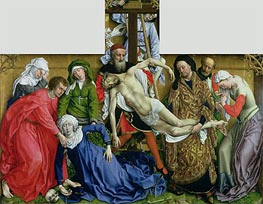
Descent from the Cross c.1435
Oil Painting
$27270
$27270
Canvas Print
$82.14
$82.14
SKU: WRV-916
Rogier van der Weyden
Original Size: 220 x 262 cm
Prado Museum, Madrid, Spain
Rogier van der Weyden
Original Size: 220 x 262 cm
Prado Museum, Madrid, Spain
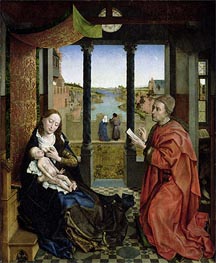
Saint Luke Drawing the Virgin c.1435/40
Oil Painting
$17834
$17834
Canvas Print
$102.24
$102.24
SKU: WRV-917
Rogier van der Weyden
Original Size: 137.5 x 110.8 cm
Boston Museum of Fine Arts, Massachusetts, USA
Rogier van der Weyden
Original Size: 137.5 x 110.8 cm
Boston Museum of Fine Arts, Massachusetts, USA
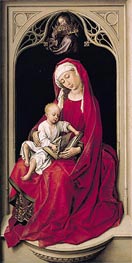
Virgin and Child (Duran Madonna) c.1435/38
Oil Painting
$5625
$5625
Canvas Print
$56.94
$56.94
SKU: WRV-918
Rogier van der Weyden
Original Size: 100 x 52 cm
Prado Museum, Madrid, Spain
Rogier van der Weyden
Original Size: 100 x 52 cm
Prado Museum, Madrid, Spain
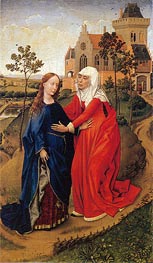
Visitation of Mary c.1440/45
Oil Painting
$5333
$5333
Canvas Print
$58.53
$58.53
SKU: WRV-919
Rogier van der Weyden
Original Size: 57 x 36 cm
Museum der Bildenden Kunste, Leipzig, Germany
Rogier van der Weyden
Original Size: 57 x 36 cm
Museum der Bildenden Kunste, Leipzig, Germany
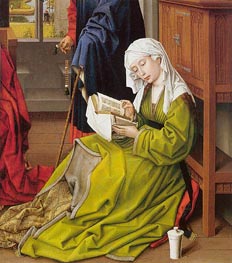
The Magdalen Reading a.1438
Oil Painting
$4640
$4640
Canvas Print
$73.74
$73.74
SKU: WRV-920
Rogier van der Weyden
Original Size: 62.2 x 54.4 cm
National Gallery, London, UK
Rogier van der Weyden
Original Size: 62.2 x 54.4 cm
National Gallery, London, UK
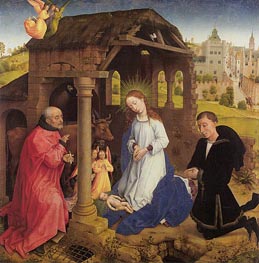
Nativity, central panel of Middelburg Altarpiece c.1445/48
Oil Painting
$18223
$18223
Canvas Print
$59.05
$59.05
SKU: WRV-921
Rogier van der Weyden
Original Size: 91 x 89 cm
Gemaldegalerie, Berlin, Germany
Rogier van der Weyden
Original Size: 91 x 89 cm
Gemaldegalerie, Berlin, Germany
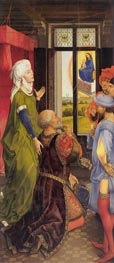
Vision of the Emperor Octavian c.1445/48
Oil Painting
$7134
$7134
Canvas Print
$56.94
$56.94
SKU: WRV-922
Rogier van der Weyden
Original Size: 91 x 40 cm
Gemaldegalerie, Berlin, Germany
Rogier van der Weyden
Original Size: 91 x 40 cm
Gemaldegalerie, Berlin, Germany
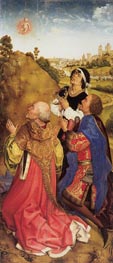
Three Magi c.1445/48
Oil Painting
$7442
$7442
Canvas Print
$56.94
$56.94
SKU: WRV-923
Rogier van der Weyden
Original Size: 91 x 40 cm
Gemaldegalerie, Berlin, Germany
Rogier van der Weyden
Original Size: 91 x 40 cm
Gemaldegalerie, Berlin, Germany
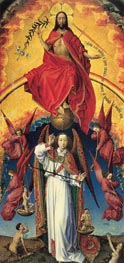
Christ and St. Michael c.1450
Oil Painting
$11891
$11891
SKU: WRV-924
Rogier van der Weyden
Original Size: unknown
Musee Hotel-Dieu, Beaune, France
Rogier van der Weyden
Original Size: unknown
Musee Hotel-Dieu, Beaune, France
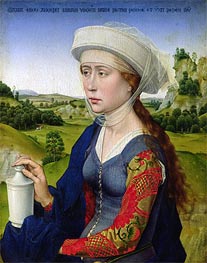
St. Mary Magdalene c.1450
Oil Painting
$3900
$3900
Canvas Print
$56.94
$56.94
SKU: WRV-925
Rogier van der Weyden
Original Size: 41 x 34 cm
Louvre Museum, Paris, France
Rogier van der Weyden
Original Size: 41 x 34 cm
Louvre Museum, Paris, France
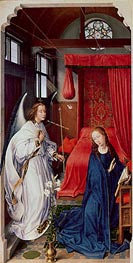
The Annunciation c.1455
Oil Painting
$9768
$9768
Canvas Print
$72.92
$72.92
SKU: WRV-926
Rogier van der Weyden
Original Size: 138 x 70 cm
Alte Pinakothek, Munich, Germany
Rogier van der Weyden
Original Size: 138 x 70 cm
Alte Pinakothek, Munich, Germany
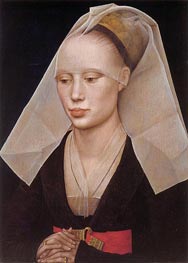
Portrait of a Lady c.1460
Oil Painting
$2991
$2991
Canvas Print
$56.94
$56.94
SKU: WRV-927
Rogier van der Weyden
Original Size: 34 x 25.5 cm
National Gallery of Art, Washington, USA
Rogier van der Weyden
Original Size: 34 x 25.5 cm
National Gallery of Art, Washington, USA
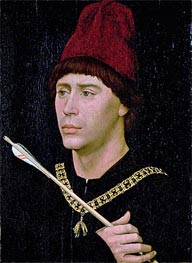
Portrait of Anthony of Burgundy c.1456
Oil Painting
$3204
$3204
Canvas Print
$56.94
$56.94
SKU: WRV-928
Rogier van der Weyden
Original Size: 38.4 x 28 cm
Royal Museums of Fine Arts, Brussels, Belgium
Rogier van der Weyden
Original Size: 38.4 x 28 cm
Royal Museums of Fine Arts, Brussels, Belgium
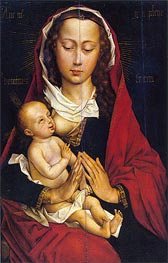
Madonna c.1460/75
Oil Painting
$3852
$3852
Canvas Print
$56.94
$56.94
SKU: WRV-929
Rogier van der Weyden
Original Size: 51.5 x 33.5 cm
Musee des Beaux Arts, Caen, France
Rogier van der Weyden
Original Size: 51.5 x 33.5 cm
Musee des Beaux Arts, Caen, France
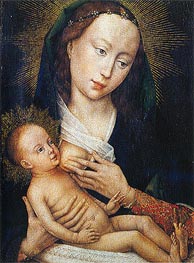
Madonna c.1450/60
Oil Painting
$2815
$2815
Canvas Print
$56.94
$56.94
SKU: WRV-930
Rogier van der Weyden
Original Size: 36 x 27 cm
Musee des Beaux Arts, Tournai, Belgium
Rogier van der Weyden
Original Size: 36 x 27 cm
Musee des Beaux Arts, Tournai, Belgium
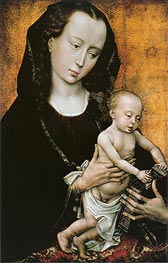
Madonna c.1460
Oil Painting
$4713
$4713
Canvas Print
$56.94
$56.94
SKU: WRV-931
Rogier van der Weyden
Original Size: 49 x 31 cm
Huntington Library and Art Gallery, California, USA
Rogier van der Weyden
Original Size: 49 x 31 cm
Huntington Library and Art Gallery, California, USA
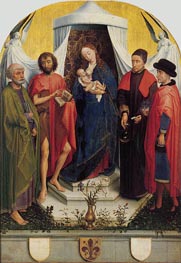
Medici Madonna c.1460
Oil Painting
$8039
$8039
Canvas Print
$59.30
$59.30
SKU: WRV-932
Rogier van der Weyden
Original Size: 61.7 x 46.1 cm
Städel Museum, Frankfurt am Main, Germany
Rogier van der Weyden
Original Size: 61.7 x 46.1 cm
Städel Museum, Frankfurt am Main, Germany
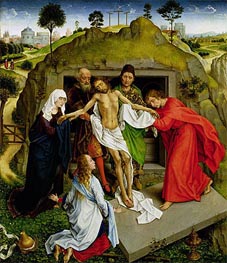
Entombment of Christ c.1450
Oil Painting
$19377
$19377
Canvas Print
$107.14
$107.14
SKU: WRV-933
Rogier van der Weyden
Original Size: 110 x 96 cm
Galleria degli Uffizi, Florence, Italy
Rogier van der Weyden
Original Size: 110 x 96 cm
Galleria degli Uffizi, Florence, Italy
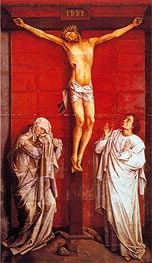
Crucifixion c.1460
Oil Painting
$6487
$6487
Canvas Print
$56.94
$56.94
SKU: WRV-934
Rogier van der Weyden
Original Size: 325 x 192 cm
Real Monasterio de San Lorenzo de El Escorial, Madrid, Spain
Rogier van der Weyden
Original Size: 325 x 192 cm
Real Monasterio de San Lorenzo de El Escorial, Madrid, Spain
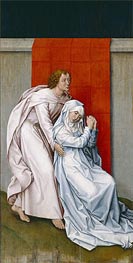
Virgin and Saint John the Evangelist Mourning c.1450/55
Oil Painting
$5451
$5451
Canvas Print
$56.94
$56.94
SKU: WRV-935
Rogier van der Weyden
Original Size: 180.3 x 93.8 cm
Philadelphia Museum of Art, Pennsylvania, USA
Rogier van der Weyden
Original Size: 180.3 x 93.8 cm
Philadelphia Museum of Art, Pennsylvania, USA
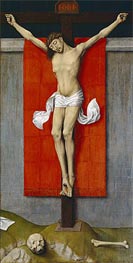
The Crucifixion c.1450/55
Oil Painting
$4460
$4460
Canvas Print
$56.94
$56.94
SKU: WRV-936
Rogier van der Weyden
Original Size: 180.3 x 92.6 cm
Philadelphia Museum of Art, Pennsylvania, USA
Rogier van der Weyden
Original Size: 180.3 x 92.6 cm
Philadelphia Museum of Art, Pennsylvania, USA
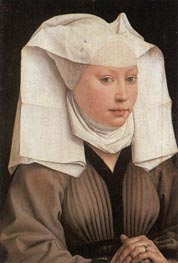
Lady Wearing a Gauze Headdress c.1435/40
Oil Painting
$3082
$3082
Canvas Print
$56.94
$56.94
SKU: WRV-3171
Rogier van der Weyden
Original Size: 47 x 32 cm
Gemaldegalerie, Berlin, Germany
Rogier van der Weyden
Original Size: 47 x 32 cm
Gemaldegalerie, Berlin, Germany
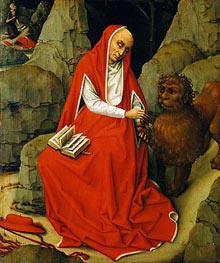
Saint Jerome in the Desert c.1450/65
Oil Painting
$2849
$2849
Canvas Print
$56.94
$56.94
SKU: WRV-7951
Rogier van der Weyden
Original Size: 30.8 x 25.2 cm
Detroit Institute of Arts, Michigan, USA
Rogier van der Weyden
Original Size: 30.8 x 25.2 cm
Detroit Institute of Arts, Michigan, USA
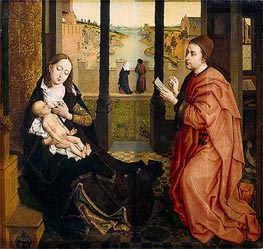
St Luke Drawing the Virgin n.d.
Oil Painting
$10888
$10888
Canvas Print
$135.10
$135.10
SKU: WRV-7952
Rogier van der Weyden
Original Size: 102.5 x 108.5 cm
The State Hermitage Museum, St. Petersburg, Russia
Rogier van der Weyden
Original Size: 102.5 x 108.5 cm
The State Hermitage Museum, St. Petersburg, Russia